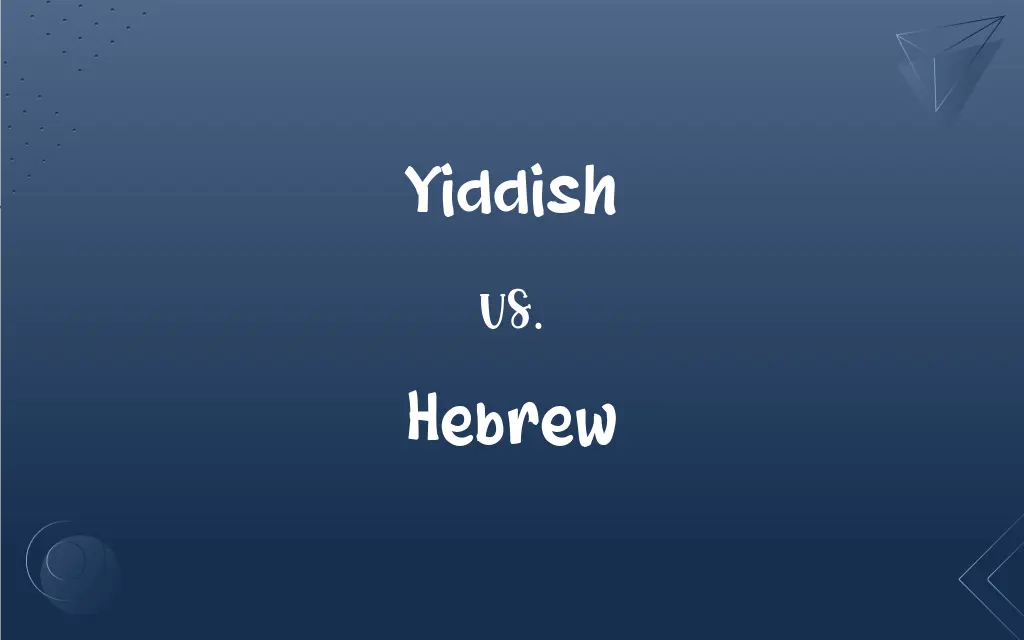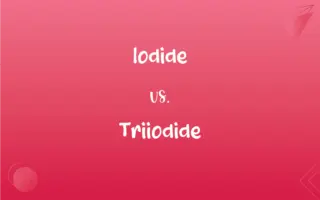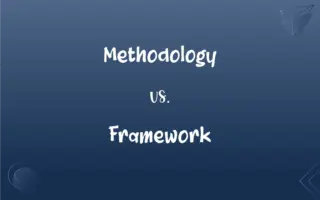Yiddish vs. Hebrew: What's the Difference?
Edited by Harlon Moss || By Janet White || Published on January 4, 2024
Yiddish is a Germanic language historically spoken by Ashkenazi Jews, while Hebrew is a Semitic language and the official language of Israel.

Key Differences
Yiddish, developed in Central Europe, is a High German-derived language with influences from Hebrew and Slavic languages. Hebrew, an ancient Semitic language, has been revived as the modern language of Israel.
Yiddish was primarily spoken by Ashkenazi Jews and features a significant amount of Hebrew-derived vocabulary. Hebrew, with its biblical origins, has been modernized and adapted for contemporary use in Israel.
The script used in Yiddish is primarily the Hebrew alphabet, but its pronunciation and grammar are more akin to German. Hebrew, both ancient and modern, uses its own unique Semitic grammar and syntax.
Yiddish culture and literature flourished in Eastern Europe and America, particularly in the 19th and 20th centuries. Hebrew, though ancient, experienced a cultural and linguistic revival in the 19th and 20th centuries, aligning with the Zionist movement.
Yiddish has a rich tradition in theater, literature, and folk music, reflecting the experiences of Ashkenazi Jews. Hebrew is not only a language of daily communication in Israel but also of religious texts and historical literature.
ADVERTISEMENT
Comparison Chart
Origin
Central Europe, High German-derived
Ancient Semitic, Middle East origin
Primary Speakers
Ashkenazi Jews
Jewish people, Israelis
Writing System
Hebrew alphabet
Hebrew alphabet
Linguistic Influences
German, Hebrew, Slavic languages
Ancient Semitic languages
Cultural Significance
Ashkenazi Jewish culture
Jewish religious and modern Israeli
ADVERTISEMENT
Yiddish and Hebrew Definitions
Yiddish
A Germanic language of Ashkenazi Jews.
Yiddish words often appear in English conversations.
Hebrew
Official language of Israel.
Hebrew signs are common in Israeli cities.
Yiddish
Spoken by Eastern European Jews.
Yiddish songs are passed down through generations.
Hebrew
Language of Jewish religious texts.
Hebrew prayers are recited in synagogues.
Yiddish
Language with Hebrew, Slavic influences.
Yiddish literature is a rich cultural heritage.
Hebrew
A symbol of Jewish identity.
Learning Hebrew connects one to Jewish heritage.
Yiddish
Characterized by its unique expressions.
Yiddish proverbs often contain wise insights.
Hebrew
Ancient Semitic language, modernized.
Hebrew is taught in many Jewish schools worldwide.
Yiddish
A language of Jewish diaspora.
Yiddish theater was vibrant in the 20th century.
Hebrew
Revived in the 19th century.
Hebrew literature has grown since its revival.
Yiddish
The language historically of Ashkenazic Jews of Central and Eastern Europe, resulting from a fusion of elements derived principally from medieval German dialects and secondarily from Hebrew and Aramaic, various Slavic languages, and Old French and Old Italian.
Hebrew
A member of an ancient Semitic people claiming descent from Abraham, Isaac, and Jacob; an Israelite.
Yiddish
A language used by German and other Jews, being a Middle German dialect developed under Hebrew and Slavic influence. It is written in Hebrew characters.
Hebrew
A descendant of this people; a Jew.
Yiddish
A dialect of High German including some Hebrew and other words; spoken in Europe as a vernacular by many Jews; written in the Hebrew script
FAQs
Is Yiddish still widely spoken?
It's less common now but still spoken in some Jewish communities.
How old is the Hebrew language?
Hebrew dates back over 3,000 years.
Can Yiddish speakers understand Hebrew?
Partially, due to shared vocabulary and script.
Was Hebrew always a spoken language?
It was revived in the 19th century; previously, it was mainly liturgical.
Are new words still being added to Hebrew?
Yes, modern Hebrew continuously evolves.
How similar are Yiddish and German?
They share linguistic roots but are distinct languages.
Are Yiddish and Hebrew mutually intelligible?
Not entirely, as they are distinct languages.
Is Yiddish a dying language?
Its use has declined but efforts are being made to preserve it.
Is Hebrew hard to learn?
It can be challenging due to its unique script and grammar.
Is Hebrew used in religious contexts only?
No, it's also Israel's everyday language.
Do Yiddish and Hebrew have the same grammar?
No, their grammatical structures are quite different.
Does Hebrew have dialects?
Not significantly, especially in modern standardized Hebrew.
Is Yiddish primarily a written or spoken language?
Historically both, but more commonly spoken in daily life.
Is Yiddish taught in schools?
In some Jewish schools, particularly in Hasidic communities.
What script is used to write Yiddish?
The Hebrew alphabet, with some modifications.
Has Hebrew influenced other languages?
Yes, especially religious and scholarly languages.
Can Yiddish be found in mainstream culture?
Yes, in music, literature, and expressions.
Is Yiddish influenced by other languages?
Yes, notably German and Slavic languages.
Are Hebrew letters similar to Arabic?
They share some similarities, as both are Semitic languages.
Is modern Hebrew different from biblical Hebrew?
Yes, modern Hebrew has evolved significantly from its ancient form.
About Author
Written by
Janet WhiteJanet White has been an esteemed writer and blogger for Difference Wiki. Holding a Master's degree in Science and Medical Journalism from the prestigious Boston University, she has consistently demonstrated her expertise and passion for her field. When she's not immersed in her work, Janet relishes her time exercising, delving into a good book, and cherishing moments with friends and family.
Edited by
Harlon MossHarlon is a seasoned quality moderator and accomplished content writer for Difference Wiki. An alumnus of the prestigious University of California, he earned his degree in Computer Science. Leveraging his academic background, Harlon brings a meticulous and informed perspective to his work, ensuring content accuracy and excellence.































































